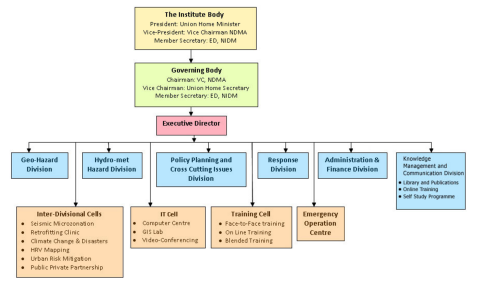COVID-19 Rapid Student Interview Project

This project aims to provide an engaging project for post-secondary students (undergraduate and graduate) to gain experience with qualitative research methodology while contributing to public

This project aims to provide an engaging project for post-secondary students (undergraduate and graduate) to gain experience with qualitative research methodology while contributing to public
The Disaster Management Act of 2005 constitutes the responsibilites of the NIDM to be human resource development, capacity building, training, research, documentation and policy advocacy in the field of disaster management. The organization aims to promote disaster management as a high priority in the national goverment. They also aspire to create "a culture of prevention" pertaining to disasters that involves all stakeholders.
As they sustain in their web page, their goal is: no poverty, zero hunger, good health weel being, quality educational, gender quality, clean water and sanitation, affordable and clean energy, decent work and economic growth, industry, innovation and infrastucture, reduced inequality, sustainable cities, partnership goals, peace, justice, strong institucions, life below water, and much much more.
What is more they divide their focus, though, on three ways: sustainable development, democratic governance and climate and disaster resiliance.
The author is Alex Napoliello, who covers Monmouth and Ocean counties for NJ Advance Media. Also he provide us where to can find his reporting on NJ.com and in The Star-Ledger (also mainlly contact: phone, email...).
The Minister of Home Affairs acts as the President, and the Vice Chairman of the NDMA (National Disaster Management Authority) acts as Vice President. The body of the organiation is comprised of 42 members including secretaries of nodal Ministries and Departments of Government of India and State Governments, the heads of national scientific, research and technical organizations, and eminent scientists and practioners. The governing body of the organization, which runs its day to day operations, is comprised of 16 members, and is chaired by the Vice Chairman of the NDMA, with the Secretary of Home Affairs acting as the Vice President.

Important date correspond to: close to a 50% of childs with less tha 3 years are in low income families. Whereas a 26% are poor (from the same group.)
The Disaster Management Act of 2005 constitutes the responsibilites of the NIDM to be human resource development, capacity building, training, research, documentation and policy advocacy in the field of disaster management. The organization aims to promote disaster management as a high priority in the national goverment. They also aspire to create "a culture of prevention" pertaining to disasters that involves all stakeholders.
As a sesearch from the Rotgers University, the students or researchers support:
- The child poverty in becoming more concentrated. With the numbers next to us, we can say that a 52.5% of the poorest childs live in census were the concentration is above a 40%
- Inner-ring suburbs of Orange, East Orange, and Irvington have seen the largest increases in child poverty.
- Essex County’s smallest municipalities have very low child poverty, although many have seen their child poverty rates increase by more than 50 percent since 2000
First of all I would like to highlight the first source used in the new. The map with the risk on air polution in Newark.
Now I'll point out the two qutes suggested:
"Air quality was analyzed using proximity to 5 factors: major roads, truck routes, rail lines, Newark airport are all nonpoint sources and facilities that have violated their major permit at least once within the last 3 years are point sources. Point sources were buffered 1 miles for the area of high risk, and 1.5 miles for the area of elevated risk."
(at the begging of the last paragraph)
"This project is an attempt to identify those areas of high risk and the people being affected by poor air quality. It can be used to inform the public about their risk and to influence policy makers and developers."
(the fourth paragraph)